

Greek underworld. In mythology, the Greek underworld is an otherworld where souls go after death.
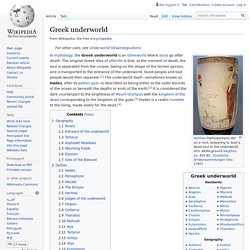
The original Greek idea of afterlife is that, at the moment of death, the soul is separated from the corpse, taking on the shape of the former person, and is transported to the entrance of the underworld. Good people and bad people would then separate.[1] The underworld itself—sometimes known as Hades, after its patron god—is described as being either at the outer bounds of the ocean or beneath the depths or ends of the earth.[2] It is considered the dark counterpart to the brightness of Mount Olympus with the kingdom of the dead corresponding to the kingdom of the gods.[3] Hades is a realm invisible to the living, made solely for the dead.[4]
Hades. God of the underworld in Greek mythology Name Amphora Hades Louvre G209 n2; Marie-Lan Nguyen / Wikimedia Commons In Homeric and Ionic Greek, he was known as Áïdēs.[6] Other poetic variations of the name include Aïdōneús (Ἀϊδωνεύς) and the inflected forms Áïdos (Ἄϊδος, gen.), Áïdi (Ἄϊδι, dat.), and Áïda (Ἄϊδα, acc.), whose reconstructed nominative case *Áïs (*Ἄϊς) is, however, not attested.[7] The name as it came to be known in classical times was Háidēs (Ἅιδης).
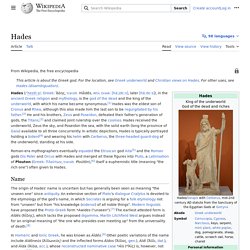
Later the iota became silent, then a subscript marking (ᾍδης), and finally omitted entirely (Άδης).[8] Mount Olympus. Olympus' highest peak, Mytikas Stratospheric view of Mount Olympus Every year, thousands of visitors admire its fauna and flora, tour its slopes, and climb its peaks.
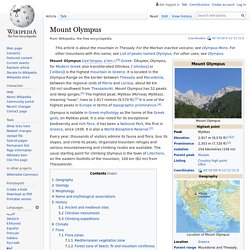
Organized mountain refuges and various mountaineering and climbing routes are available. The usual starting point for climbing Olympus is the town of Litochoro, on the eastern foothills of the mountain, 100 km (62 mi) from Thessaloniki. Dionysus. Ancient Greek god of winemaking and wine Dionysus (; Greek: Διόνυσος) is the god of the grape-harvest, winemaking and wine, of fertility, orchards and fruit, vegetation, insanity, ritual madness, religious ecstasy, festivity and theatre in ancient Greek religion and myth.[2][3][4] He is also known as Bacchus ( or ; Greek: Βάκχος, Bákkhos), the name adopted by the Romans;[5] the frenzy he induces is bakkheia.
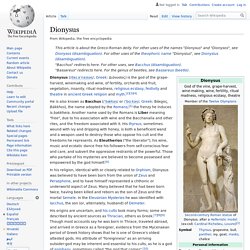
Hestia. Greek goddess Etymology[edit] Hestia's name means "hearth, fireplace, altar",[2] This stems from the PIE root *wes, "burn" (ult. from *h₂wes- "dwell, pass the night, stay").[3][4][5] It thus refers to the oikos, the domestic, home, household, house, or family.
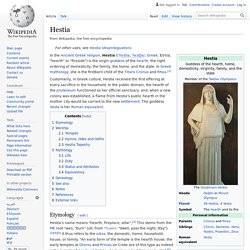
"An early form of the temple is the hearth house; the early temples at Dreros and Prinias on Crete are of this type as indeed is the temple of Apollo at Delphi which always had its inner hestia".[6] The Mycenaean great hall (megaron), like Homer's hall of Odysseus at Ithaca, had a central hearth. Hermes. Ancient Greek god of boundaries, roads, merchants, and thieves Hermes (; Greek: Ἑρμῆς) is a deity in ancient Greek religion and mythology.
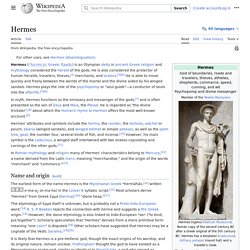
Hermes is considered the herald of the gods, as well as the protector of human heralds, travellers, thieves,[1] merchants, and orators.[2][3] He is able to move quickly and freely between the worlds of the mortal and the divine, aided by his winged sandals. Hermes plays the role of the psychopomp or "soul guide" — a conductor of souls into the afterlife.[4][5] His attributes and symbols include the herma, the rooster, the tortoise, satchel or pouch, talaria (winged sandals), and winged helmet or simple petasos, as well as the palm tree, goat, the number four, several kinds of fish, and incense.[9] However, his main symbol is the caduceus, a winged staff intertwined with two snakes copulating and carvings of the other gods.[10] His attributes had previously influenced the earlier Etruscan god Turms, a name borrowed from the Greek "herma".[11]
Aphrodite. Ancient Greek goddess of love Etymology Hesiod derives Aphrodite from aphrós (ἀφρός) "sea-foam", interpreting the name as "risen from the foam",[5] but most modern scholars regard this as a spurious folk etymology.
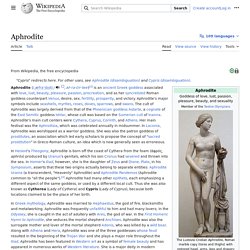
Early modern scholars of classical mythology attempted to argue that Aphrodite's name was of Greek or Indo-European origin, but these efforts have now been mostly abandoned. Aphrodite's name is generally accepted to be of non-Greek, probably Semitic, origin, but its exact derivation cannot be determined. Hephaestus. Greek god of blacksmiths As a smithing god, Hephaestus made all the weapons of the gods in Olympus.

He served as the blacksmith of the gods, and was worshipped in the manufacturing and industrial centres of Greece, particularly Athens. Artemis. Deity in ancient Greek religion and myth Artemis is the daughter of Zeus and Leto, and the twin sister of Apollo.
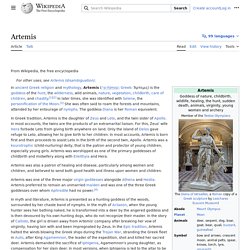
She was the patron and protector of young girls, and was believed to bring disease upon women and relieve them of it. Artemis was worshipped as one of the primary goddesses of childbirth and midwifery along with Eileithyia. Much like Athena and Hestia, Artemis preferred to remain a maiden and is sworn never to marry. Artemis was one of the most widely venerated of the Ancient Greek deities, and her temple at Ephesus was one of the Seven Wonders of the Ancient World. Apollo. Apollo (Attic, Ionic, and Homeric Greek: Ἀπόλλων, Apollōn (GEN Ἀπόλλωνος); Doric: Ἀπέλλων, Apellōn; Arcadocypriot: Ἀπείλων, Apeilōn; Aeolic: Ἄπλουν, Aploun; Latin: Apollō) is one of the most important and complex of the Olympian deities in classical Greek and Roman religion and Greek and Roman mythology.
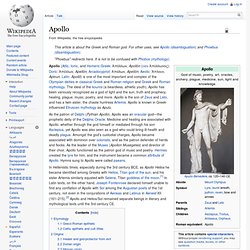
The ideal of the kouros (a beardless, athletic youth), Apollo has been variously recognized as a god of light and the sun, truth and prophecy, healing, plague, music, poetry, and more. Apollo is the son of Zeus and Leto, and has a twin sister, the chaste huntress Artemis. Apollo is known in Greek-influenced Etruscan mythology as Apulu. Etymology. Apollo. Demeter. Greek goddess of the harvest, grains, and agriculture Etymology[edit] It is possible that Demeter appears in Linear A as da-ma-te on three documents (AR Zf 1 and 2, and KY Za 2), all three apparently dedicated in religious situations and all three bearing just the name (i-da-ma-te on AR Zf 1 and 2).[5] It is unlikely that Demeter appears as da-ma-te in a Linear B (Mycenean Greek) inscription (PY En 609); the word 𐀅𐀔𐀳, da-ma-te, probably refers to "households".[6][7] On the other hand, 𐀯𐀵𐀡𐀴𐀛𐀊, si-to-po-ti-ni-ja, "Potnia of the Grain", is regarded as referring to her Bronze Age predecessor or to one of her epithets.[8] Demeter's character as mother-goddess is identified in the second element of her name meter (μήτηρ) derived from Proto-Indo-European (PIE) *méh₂tēr (mother).[9] In antiquity, different explanations were already proffered for the first element of her name.
M. Hephaestus. Ares. Ancient Greek god of war Ares (; Ancient Greek: Ἄρης, Áres [árɛːs]) is the Greek god of war. He is one of the Twelve Olympians, the son of Zeus and Hera.[1] In Greek literature, he often represents the physical or violent and untamed aspect of war and is the personification of sheer brutality, in contrast to his sister, the armored Athena, whose functions as a goddess of intelligence include military strategy and generalship.[2] Ares plays a relatively limited role in Greek mythology as represented in literary narratives, though his numerous love affairs and abundant offspring are often alluded to.[7] When Ares does appear in myths, he typically faces humiliation.[8] He is well known as the lover of Aphrodite, the goddess of love, who was married to Hephaestus, god of craftsmanship.[9] The most famous story related to Ares and Aphrodite shows them exposed to ridicule through the wronged husband's device.[10] Names[edit] Character, origins, and worship[edit]
Artemis. Apollo. Athena. Ancient Greek goddess of wisdom Athena[b] or Athene,[c] often given the epithet Pallas,[d] is an ancient Greek goddess associated with wisdom, handicraft, and warfare[1] who was later syncretized with the Roman goddess Minerva. Athena was regarded as the patron and protectress of various cities across Greece, particularly the city of Athens, from which she most likely received her name. Demeter. Poseidon. Ancient Greek god of the sea, earthquakes and horses Poseidon was protector of seafarers, and of many Hellenic cities and colonies. Homer and Hesiod suggest that Poseidon became lord of the sea following the defeat of his father Cronus, when the world was divided by lot among his three sons; Zeus was given the sky, Hades the underworld, and Poseidon the sea, with the Earth and Mount Olympus belonging to all three.[2][5]In Homer's Iliad, Poseidon supports the Greeks against the Trojans during the Trojan War and in the Odyssey, during the sea-voyage from Troy back home to Ithaca, the Greek hero Odysseus provokes Poseidon's fury by blinding his son, the Cyclops Polyphemus, resulting in Poseidon punishing him with storms, the complete loss of his ship and companions, and a ten-year delay.
Poseidon is also the subject of a Homeric hymn. In Plato's Timaeus and Critias, the legendary island of Atlantis was Poseidon's domain.[6][7][8] Hera. Goddess from Greek mythology, wife and sister of Zeus Hera is commonly seen with the animals she considers sacred, including the cow, lion and the peacock. Portrayed as majestic and solemn, often enthroned, and crowned with the polos (a high cylindrical crown worn by several of the Great Goddesses), Hera may hold a pomegranate in her hand, emblem of fertile blood and death and a substitute for the narcotic capsule of the opium poppy.[1] Scholar of Greek mythology Walter Burkert writes in Greek Religion, "Nevertheless, there are memories of an earlier aniconic representation, as a pillar in Argos and as a plank in Samos. Zeus. Twelve Olympians.
Greekmythology.wikia. Olympos. Greekgodsandgoddesses. En.m.wikipedia. Riordan.fandom. Rome and Italy at the Opening of the Œcumenical Council: Depicted in Twelve ... - Google Books. Lares. Pliny the Elder. Tanaquil. Lucius Tarquinius Priscus. Tandarius roman - Recherche Google. Tandarius roman - Recherche Google. Tandarius roman - Recherche Google. Tandarius roman - Recherche Google. Tandarius roman. Tandarius roman - Recherche Google. Tandarius roman. Tandarius roman - Recherche Google. Tandarius roman - Buscar con Google. Tandarius roman - Recherche Google. Jupiter. Terracina.
Feronia. Fortuna. Pompeian Styles. Triclinium. House of the Vettii. Triclinium. Nephele. Blond. Mercury. Ixion. Romulus. Servius Tullius. Aventine Hill. Cacus. Caeculus. Palestrina. Loyalty. Wild boar. Cattle. Domitian. Quirinal Hill. Great Fire of Rome. Parthia. Battle of Carrhae. Bonfire. August 23. Bonfire. Metalworking. Hephaestus. Smith. Campus Martius. Capitoline Hill. Pomerium. Haruspex. Etruscan civilization. Titus Tatius. King of Rome. Roman Forum. Capitoline Hill. Titus Tatius. Annales maximi. Marcus Terentius Varro. Sethlans (mythology) Hephaestus. Dionysus. Diana. Apollo. Bellona. Hercules. Minerva. Mars. Juno.
Jupiter. Venus. Vulcanal. Pausanias.